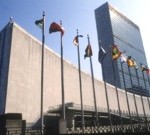 UNITED NATIONS FORUM ON FORESTS SEEKS TO FINALIZE NEW INTERNATIONAL AGREEMENT AT HEADQUARTERS 16-27 APRIL
UNITED NATIONS FORUM ON FORESTS SEEKS TO FINALIZE NEW INTERNATIONAL AGREEMENT AT HEADQUARTERS 16-27 APRILOver 500 delegates from Governments, intergovernmental organizations and civil society are participating in the United Nations Forum on Forests next week at United Nations Headquarters.
The meeting, which runs from 16 to 27 April, is expected to result in a landmark international agreement on sustainable management of the world’s forests. The new agreement will represent a turning point in international efforts to strengthen and coordinate global forest policies.
The meeting comes at a time of growing global recognition on the role of forests in stabilizing climate change, protecting biodiversity and in the livelihoods of 1.6 billion people who depend on them. In 2006, Member States agreed on four shared global objectives on forests, reflecting the strong political commitment to advance sustainable forest management, curb deforestation and enhance the contribution of forests to the achievement of international development goals. Current efforts have helped many countries stem the tide of centuries of deforestation through forest planting and restoration, but further global action is needed.
Global forest cover, according to data from the Food and Agriculture Organization (FAO), amounts to just under 4 billion hectares, covering about 30 per cent of the world’s land area. From 1990 to 2005, the world lost 3 per cent of its total forest area, an average decrease of some 0.2 per cent per year.
During a one-week meeting last December, forestry experts began discussions on the draft text for the international agreement to manage the world’s forests. Strong support emerged on certain issues within the agreement, which included strengthening national level policies and measures related to forests, the importance of international trade in forest products and the need for a strengthened scientific basis for forest policy. Experts also stressed the need for public awareness and education on forests.
The new agreement to be negotiated at the Forum over the next two weeks, will represent a “great leap forward” for international forest policy, says Hans Hoogeveen, Chairman of this year’s session. “Such a new instrument would provide a well-articulated, coordinated and practical framework for sustainable forest management at all levels, and demonstrate clarity, credibility, commitment and continuity.”
According to Pekka Patosaari, Director of the United Nations Forum on Forests Secretariat, “this agreement would significantly advance efforts to galvanize international cooperation and support for a new people-centred forest policy agenda, with actions for increased pro-poor, pro-nature and pro-growth actions that link trees and forests to the achievement of the internationally agreed development goals”.
The Forum is the only global body for comprehensive intergovernmental deliberations on international forest policy. This year, all Member States of the United Nations have announced their participation, including ministers from Costa Rica, Côte d’Ivoire, Croatia, Gabon, Indonesia, Mexico and Poland.
This year’s session will also elaborate a new multi-year programme of work for the period 2007-2015. The programme of work will reflect the Forum’s overall purpose, functions and strategy of international forest management. It will include a description and scheduling of key tasks, including policy issues for deliberation at each session and activities in intersessional periods.
As part of the session activities, 17 side events addressing issues ranging from forest governance and economic development, to impacts of deforestation on climate change, are also being organized.
More information on the seventh session of the United Nations Forum on Forests including session documents, the organization of work and the list of side events, can be found at www.un.org/esa/forests/session.html.
Media representatives without United Nations credentials who wish to attend the Forum’s meetings should contact the Media Accreditation & Liaison Unit, United Nations Department of Public Information at tel: 212 963 2318 or fax: 212 963 4642.



